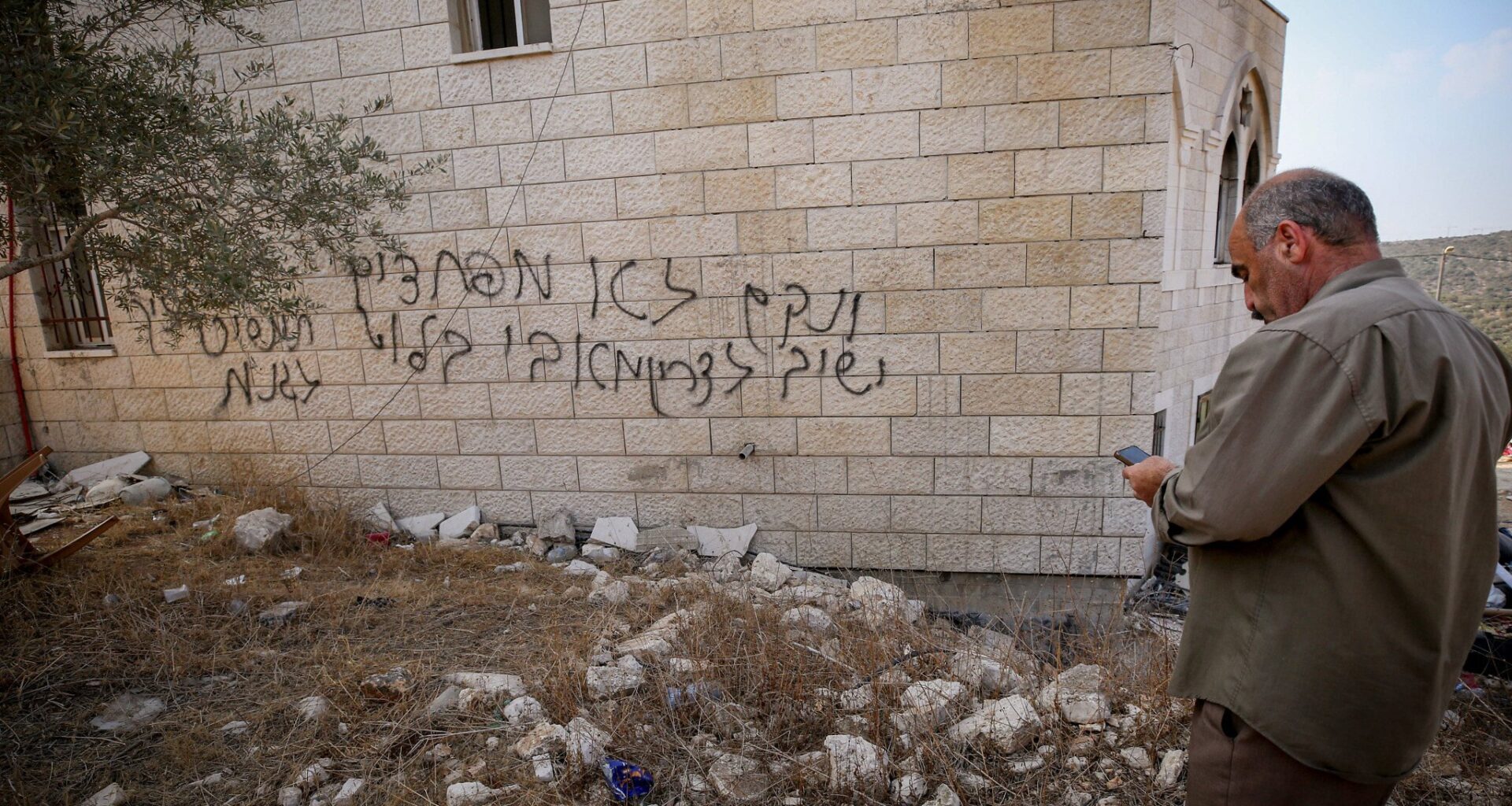Israeli settlers torched and defaced a mosque in a Palestinian village in the central West Bank overnight Wednesday, villagers said, scribbling hateful messages in a show of defiance a day after some Israeli leaders condemned a different attack by settlers against Palestinians.
One wall and at least three copies of the Quran and some of the carpeting at the mosque in the Palestinian town of Deir Istiya had been torched when an AP reporter visited on Thursday.
On one side of the mosque, the assailants had left graffitied messages of defiance like “We are not afraid of Avi Bluth,” “We will take revenge again,” and “Keep on condemning.” The Hebrew scrawl, difficult to make out, appeared to reference IDF Central Command chief Maj. Gen. Avi Bluth, who issued a rare denunciation of the violence on Wednesday, as did other army leaders.
Soldiers from the IDF, which did not immediately respond to a request for comment, were present at the scene.
It was the latest in a string of attacks that have provoked expressions of concern from top officials, military leaders and US President Donald Trump’s administration.
Get The Times of Israel’s Daily Edition
by email and never miss our top stories
By signing up, you agree to the terms
Speaking at a press conference Wednesday, US Secretary of State Marco Rubio said there was “some concern about events in the West Bank spilling over and creating an effect that could undermine what we’re doing in Gaza.”
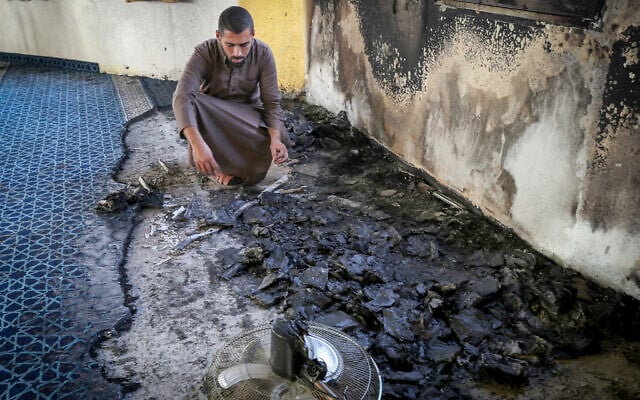
Palestinians inspect a mosque in Deir Istiya after it was set on fire by Israeli settlers, according to local residents, November 13, 2025. (Nasser Ishtayeh/Flash90)
Israeli officials have sought to cast settler violence as the work of a few extremists. But Palestinians and rights groups say the violence is widespread and carried out by settlers across the territory, with impunity from Israel’s far-right government, led by Prime Minister Benjamin Netanyahu. Netanyahu has not commented on the surge in violence.
Officials issue rare denunciations
The round of recent denunciations was in reaction to a particularly brazen attack Tuesday that saw dozens of masked Israeli settlers set fire to vehicles and other property in the Palestinian villages of Beit Lid and Deir Sharaf.
The army said the settlers then fled to a nearby industrial zone and attacked soldiers responding to the violence, damaging a military vehicle. Four Israelis were arrested, three of whom have already been released, and four Palestinians were wounded, authorities said.
President Isaac Herzog described the attacks as “shocking and serious.”
Herzog’s position, while largely ceremonial, is meant to serve as a moral compass and unifying force for the country.
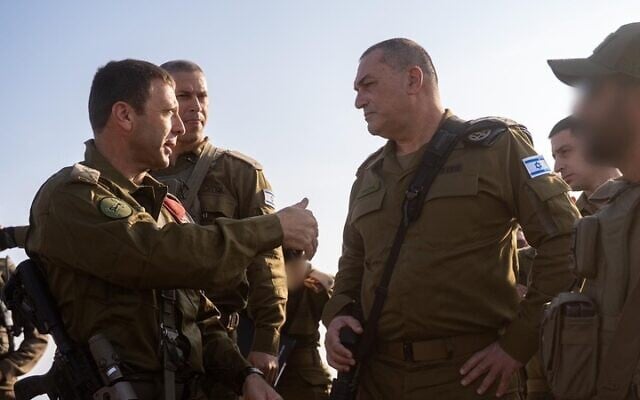
IDF Chief of Staff Lt. Gen. Eyal Zamir (right) speaks with Central Command chief Maj. Gen. Avi Bluth during a military drill in the West Bank, November 12, 2025. (Israel Defense Forces)
Herzog said the violence committed by a “handful” of perpetrators “crosses a red line,” adding in a social media post that “all state authorities must act decisively to eradicate the phenomenon and to strengthen the IDF fighters and security forces who protect us day and night.”
The Israeli army’s Chief of Staff Lt. Gen. Eyal Zamir echoed Herzog’s condemnations of the West Bank violence, saying the military “will not tolerate phenomena of a criminal minority that stains a law-abiding public.”
He said the army is committed to stopping violent acts committed by settlers, which he described as contrary to Israeli values, and that they “divert the attention of our forces from fulfilling their mission defending the communities, and conducting offensive operations.”
On Wednesday, police said three of the suspects were released. The fourth suspect, a minor arrested on suspicion of arson and assault, will remain in custody for six more days, as ordered by a judge. Police said the actions of the three who were released are still under investigation, “with the goal of bringing offenders to justice, regardless of their background.”
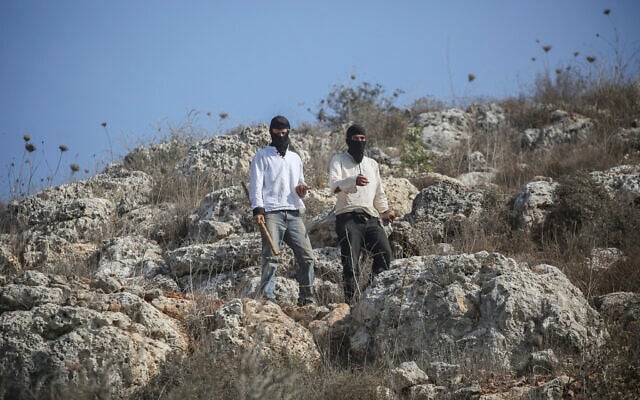
Jewish settlers attack Palestinians during the olive-picking season in the village of Beita, south of Nablus in the West Bank, November 8, 2025. (Nasser Ishtayeh/Flash90)
Not a new phenomenon
Settler violence has been steadily mounting for decades, and the mosque in Deir Istiya had previously come under attack by settlers.
Settlers vandalized the mosque in 2012, according to the US State Department, and again in 2014, according to a roundup of settler violence from the website of the Anti-Defamation League.
The violence had reached peak highs before the war in Gaza erupted two years ago, and since then, it’s only gotten worse. October was the month with the highest-ever number of recorded settler attacks in the West Bank since the UN’s humanitarian office began keeping track in 2006, said the office.
Palestinians say the goal of the violence is to push them off their lands. The UN’s humanitarian office said 3,535 Palestinians have been displaced by settler violence or access restrictions since 2023, a major upswing from previous years.
Emboldened by Netanyahu’s right-wing government, settlers have expanded beyond the bounds of pre-existing settlements to establish new farming outposts, which they call “young settlements.”
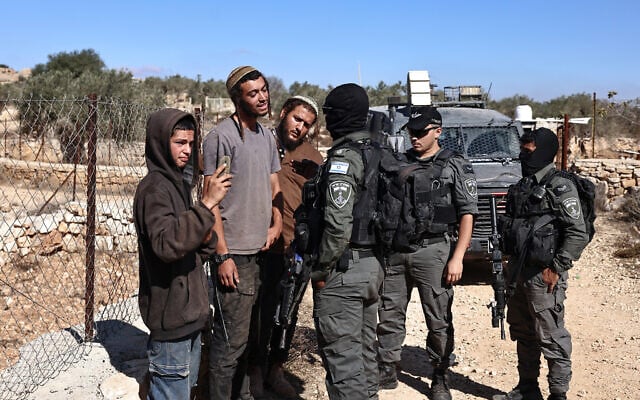
Illustrative: Israeli border guards argue with Israeli settlers attempting to disrupt the olive harvest at a grove near the Palestinian village of Silwad, northeast of Ramallah in the West Bank, on October 29, 2025. (Zain JAAFAR / AFP)
The outposts — usually little more than a few sheds and a pen for livestock — now spill down settlement hilltops toward Palestinian villages, with some settlers gaining control of the villages’ agricultural land and water sources.
Palestinians and human rights workers accuse the Israeli army and police of failing to halt attacks by settlers. The government is dominated by far-right proponents of the settler movement, including Finance Minister Bezalel Smotrich, who formulates settlement policy, and National Security Minister Itamar Ben-Gvir, who oversees the police force.
About 94% of all investigation files opened by the Israel Police into settler violence from 2005 to 2024 ended without indictment, according to monitoring by Israeli human rights group Yesh Din. Since 2005, just 3% of the investigation files opened into settler violence have led to full or partial convictions.
You appreciate our journalism

You clearly find our careful reporting valuable, in a time when facts are often distorted and news coverage often lacks context.
Your support is essential to continue our work. We want to continue delivering the professional journalism you value, even as the demands on our newsroom have grown dramatically since October 7.
So today, please consider joining our reader support group, The Times of Israel Community. For as little as $6 a month you’ll become our partners while enjoying The Times of Israel AD-FREE, as well as accessing exclusive content available only to Times of Israel Community members.
Thank you,
David Horovitz, Founding Editor of The Times of Israel
Already a member? Sign in to stop seeing this
